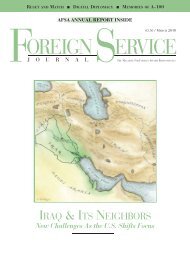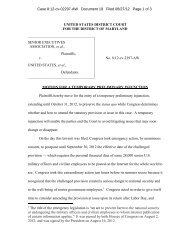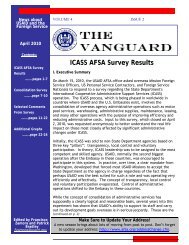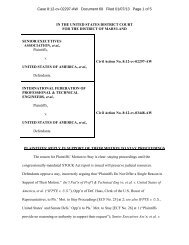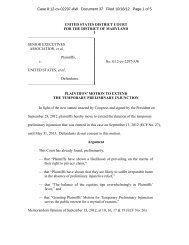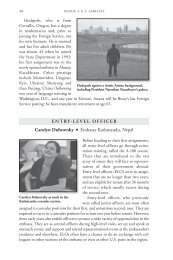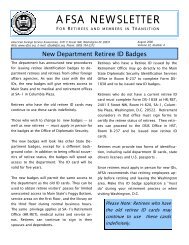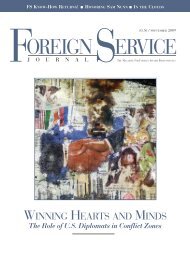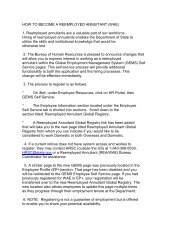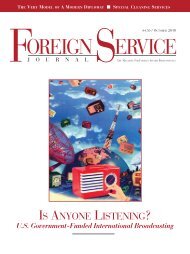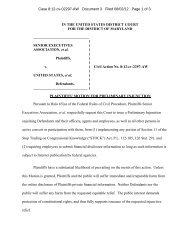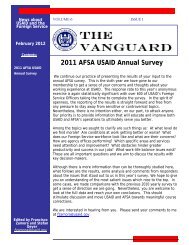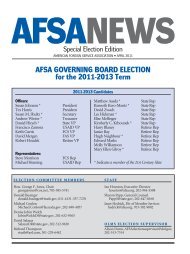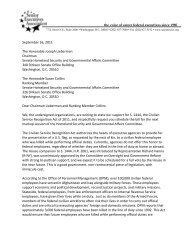F OCUS - American Foreign Service Association
F OCUS - American Foreign Service Association
F OCUS - American Foreign Service Association
Create successful ePaper yourself
Turn your PDF publications into a flip-book with our unique Google optimized e-Paper software.
F O C U S<br />
Lisbon Treaty remains unratified.<br />
Nor is there an identity for Europeans<br />
to assume. Nonetheless, the<br />
CFSP reflects a longstanding desire<br />
in European countries to have a<br />
foreign policy and a military force<br />
independent of — but not opposed<br />
to — NATO.<br />
European nations can boast an<br />
impressive numerical tally: 27<br />
armed forces, 10,000 tanks, around<br />
2,500 combat aircraft, and almost<br />
two million soldiers — but with<br />
much overlap and redundancy. According to a July 2008<br />
white paper published by the European Council on <strong>Foreign</strong><br />
Relations, “Re-Energizing Europe’s Security and<br />
Defense Policy” by Nick Witney, some “70 percent of<br />
Europe’s land forces are unable to operate outside national<br />
territory.” According to that study, one reason that<br />
the E.U.’s operational missions throughout the world remain<br />
limited in scope is that “the 5 percent of Europe’s<br />
nearly two million men and women in uniform currently<br />
overseas is the maximum that obsolete military machines<br />
can sustain.”<br />
Until 2007, Witney headed the European Defense<br />
Agency, which attempts to “improve Europe’s defense<br />
performance, by promoting coherence and a more integrated<br />
approach to capability development.” EDA’s goals<br />
may appear modest, but its attempts at coordination and<br />
efficiency among militaries that together consume onequarter<br />
of the world’s defense budgets can be made to<br />
bear fruit.<br />
France: Back in the NATO Fold?<br />
Several important European countries share membership<br />
in NATO and the E.U., but among NATO’s top<br />
powers, only France has formally separated its political<br />
and military participation. France was key to NATO’s<br />
foundation, and until 1967 was the host to the organization’s<br />
political headquarters in central Paris and military<br />
headquarters (SHAPE) in the Parisian suburbs. That all<br />
changed when President Charles de Gaulle, proclaiming<br />
France’s independence in matters strategic, pulled out of<br />
the unified military command. Ever since, NATO has<br />
been headquartered in Belgium.<br />
NATO’s 60th-anniversary summit this month will be<br />
held in Strasbourg, the most European of French cities.<br />
European member-states<br />
— which also tend to<br />
belong to the E.U. —<br />
no longer see NATO as<br />
their primary institution<br />
of reference.<br />
Sitting on the Rhine, linked by<br />
bridges to Kehl, Germany (summit<br />
co-host), it houses such important<br />
institutions as the European Parliament,<br />
the Council of Europe and<br />
the European Court of Human<br />
Rights. It is also headquarters of<br />
EUROCORPS, which grandly proclaims<br />
itself “A Force for Europe<br />
and NATO” — consisting of earmarked<br />
troops from France, Germany,<br />
Spain, Poland, Belgium and<br />
Luxembourg.<br />
Don’t expect a return to Paris — NATO will stay in<br />
Brussels and SHAPE in Mons, Belgium — but the summit<br />
in Strasbourg will mark a turning point. French President<br />
Nicolas Sarkozy has promised to return his country<br />
to NATO’s military command. In late January, NATO<br />
Secretary General Jaap de Hoop Scheffer hinted at the<br />
impending decision: “I hope that Strasbourg might be<br />
the moment in which we can welcome France’s move to<br />
take its full place again in NATO, particularly in the military<br />
structure.”<br />
Along the same lines, in early February Sarkozy and<br />
German Chancellor Angela Merkel co-authored a<br />
lengthy article that appeared in both Le Monde and the<br />
Süddeutsche Zeitung, providing the context for what they<br />
present as a net plus for both NATO and the European<br />
Union. “NATO and the E.U., alliances founded on common<br />
values,” wrote the French and German leaders,<br />
“take on increased importance” in the current context of<br />
global crises, the variety of which “requires a wider definition<br />
of security policy.”<br />
This joint declaration, coming as it did just prior to the<br />
annual Munich Security Conference and coordinated<br />
with leaks detailing France’s NATO negotiations, sets the<br />
expected French reintegration squarely within the continuum<br />
of both European Union and bilateral Franco-<br />
German security cooperation. Observing that “the<br />
overwhelming majority of European nations have preferred<br />
joining NATO and the E.U.,” the leaders underlined<br />
the near-universal appeal of both organizations.<br />
Both NATO and the E.U. form parts of a whole, which<br />
the French and German leaders call the “Euro-Atlantic<br />
security partnership.”<br />
Pres. Sarkozy’s desire to rejoin NATO’s unified military<br />
command shows that the club still has its attractions.<br />
18 F O R E I G N S E R V I C E J O U R N A L / A P R I L 2 0 0 9



